mobile Ansicht, to the English Version tap the flag


- Autonome Region Spaniens und historische Region in Frankreich
- bis 1841 Königreich
- Eigenbezeichnungen:
– Spanisch: Navarra
– Baskisch: Nafarroa
– Französisch: Navarre
• Flaggen
• historische und andere Flaggen
• Bedeutung/Ursprung der Flagge
• Wappen
• historische Wappen
• Bedeutung/Ursprung des Wappens
• Landkarte der autonomen Regionen Spaniens
• Landkarte der historischen Königreiche auf der Iberischen Halbinsel
• Zahlen und Fakten
• Geschichte
• Ursprung des Landesnamens
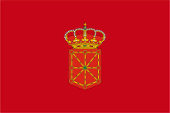
seit 1910,
Flagge von Navarra,
Seitenverhältnis = 2:3,
Quelle, nach: Flags of the World





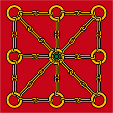
seit 1910,
Banner von Navarra,
Seitenverhältnis = 1:1,
Quelle, nach: Flags of the World




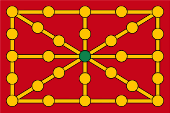
12./13. Jahrhundert,
angebliche Flagge von Navarra,
Quelle, nach: Wikipedia (ES)



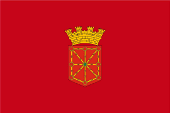
1931–1937,
Flagge von Navarra,
Quelle, nach: Wikipedia (ES)



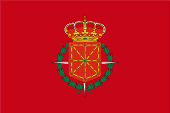
1937–1981,
Flagge von Navarra,
Quelle, nach: Wikipedia (ES)




Die Flagge von Navarra ist einfarbig rot und zeigt das Wappen von Navarra in der Mitte. Die Flagge wurde am 15.07.1910 eingeführt, ebenso ein quadratisches Wappenbanner für feierliche Anlässe. Die Flagge wurde einige Male abgeändert. Im Jahr 1931 (Spanische Republik) wurde die Königskrone auf dem Schild durch eine Mauerkrone ersetzt. Nach dem Ende der Republik in Navarra wurde die Königskrone 1937 wieder eingeführt, jedoch noch ergänzt um einen grünen Kranz und das Kreuz von San Fernando. In dieser Form bliebt die Flagge bis 1981 unverändert, bis das heutige Design eingeführt wurde. Diese Flagge wurde mit der Annahme des Autonomiestatuts am 10.08.1982 per Gesetz für die autonome Gemeinschaft Navarra übernommen. Merkwürdigerweise gibt es im Land Diskussionen darüber ob es eine Flagge von Navarra vor 1910 überhaupt gegeben hat. Dabei legte bereits die Generalcharta des Königreichs Navarra im 13. Jahrhundert fest, wie das Siegel des Königs, Münzstempel und auch sein Banner auszusehen habe. In der Zeit des Feudalismus waren Wappen oder Fahne mit der Person des Feudalherren verbunden, nicht mit dem Land oder gar der Nation. Als der Handel aufblühte, international und transkontinental wurde, als Seemächte begannen die Welt zu erobern, war es wichtig geworden Unterscheidungszeichen für Schiffe zu schaffen. Sie mussten zwar die Farben des Landes, der Stadt oder auch des Feudalherren zeigen, jedoch in einer vereinfachten, optimierten Form, die eine Unterscheidung auf große Distanzen ermöglichten. So wurden die Fahnen und Wimpel der Schiffe farblich und gestalterisch einfacher gehalten. Erst in der napoleonischen Zeit begann der nationale Gedanke zu erblühen. Der Einwohner, Landmann oder Bürger fand eine neue Identität, die sich von der Person des Fürsten zu lösen begann, und sich dem Land, Staat oder gar der Nation zuwandte. Die alten Banner machten Platz für einfache Fahnen und Flaggen – oft nur mit wenigen Strukturen oder Farben, und standen für gemeinsame Interessen oder Identitäten. Außerdem mussten sie auf einmal massenweise verfügbar, und demzufolge schnell und unkompliziert herstellbar sein. Insofern könnte es in den Jahrhunderten vor dem 15.07.1910, wie in allen anderen Ländern der Welt auch – nur eben hundert Jahre früher, keine Landesflagge gegeben haben, sondern nur die königlichen Banner. Das ist aber, wie beschrieben, keine Besonderheit. Immer wieder finden sich historische Texte die das Banner von Navarra beschreiben, als rote Fahne mit goldenen Bändern oder Ketten. Die Abbildung von Ketten wird erstmals im Jahr 1423 beschrieben. Vorher wurde ein ähnliches Konstrukt aus goldenen Stäben und Kugeln verwendet, das als "Granatapfel Goldkarfunkel" bezeichnet wird. Die Flagge des alten Königreichs war, wie damals üblich eine Wappenflagge. Das heißt, eine Flagge die das Bild des Wappens des Landes (eigentlich des Herrschers) zeigte. Demzufolge ist das Flaggentuch einfarbig weiß mit einem rot-violetten Löwen in der Mitte. In dieser Frühzeit der Flaggen waren diese eigentlich auch nicht so geformt wie unsere heutigen Flaggen. Die Flaggen glichen eher Wappen, die man mit der geraden Seite am Mast befestigte.
Quelle: Wikipedia (ES),
Volker Preuß


seit 1910,
Wappen von Navarra,
Quelle, nach: Wikipedia (ES)

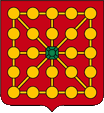
ab ca. 12. Jahrhundert,
Heraldik von Navarra,
Quelle, nach:
Wikipedia (ES)
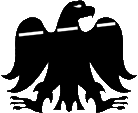
ab ca. 13. Jahrhundert,
Heraldik von Navarra,
Quelle, nach:
Wikipedia (ES)
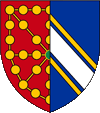
1234–1285,
Dynastie Champagne,
Wappen von Navarra,
Quelle, nach:
Wikipedia (ES)
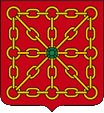
ab ca. 15. Jahrhundert,
Heraldik von Navarra,
Quelle, nach:
Wikipedia (ES)
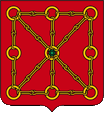
ab ca. 19. Jahrhundert,
Heraldik von Navarra,
Quelle, nach:
Wikipedia (ES)
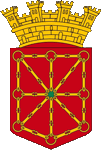
1931–1937,
Wappen von Navarra,
Quelle, nach:
Wikipedia (ES)
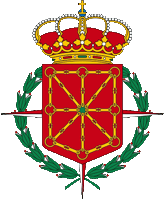
1937–1981,
Wappen von Navarra,
Quelle, nach:
Wikipedia (ES)

Das Wappen von Navarra zeigt einen einfarbig roten Schild, darauf eine Kombination aus einem geraden und einem diagonalen Kreuz und ein umlaufender Rand, gebildet aus Goldketten, mit einem Smaragd in der Mitte und darüber die Königskrone, das Symbol des Alten Königreichs Navarra. Es wurde 1910 im Zusammenhang mit der Schaffung der Flagge neu definiert und bis 1931 verwendet. In jenem Jahr (Zeit der Spanischen Republik) wurde die Königskrone durch eine Mauerkrone ersetzt, die 1937 wieder durch die königliche Krone ersetzt wurde, jedoch noch ergänzt um einen grünen Kranz und das Kreuz von San Fernando. In dieser Form blieb das Wappen bis 1981 unverändert, bis das heutige Design eingeführt wurde. Jenes Wappen wurde mit der Annahme des Autonomiestatuts am 10.08.1982 per Gesetz für die autonome Gemeinschaft Navarra übernommen. Das Wappen geht auf die Mitte des 12. Jahrhunderts zurück, auf König Sancho VI. von Navarra (1150–1194). Allerdings war das rot Wappenschild zu dieser Zeit noch nicht mit den goldenen Ketten belegt, die kamen erst Anfang des 15. Jahrhunderts in Gebrauch. Es war ein ähnliches Konstrukt, jedoch bestehend aus goldenen Stäben und Kugeln, das als "Granatapfel Goldkarfunkel" bezeichnet wird. König Sancho VII. nutzte allerdings erst mal ein anderes Symbol, vor allem als Siegel. Das war der Arrano Beltza, der schwarze Adler. Theobald, sein Nachfolger und Neffe, Graf der Champagne, regierte von 1234 bis 1253 als König Tybalt I. Er verwendete wieder das "Granatapfel Goldkarfunkel", jedoch kombiniert mit seiner eigenen Haraldik als Graf der Champagne. So wird immer wieder verfahren, je nachdem welches Adelshaus das Königreich regierte, und zwar bis 1512, als die Herrschaft des Hauses Navarra-Foix-Albret als letzte eigene Linie endet. Danach wird das Land in Obernavarra und Unternavarra geteilt und kommt jeweils an den spanischen und französischen König.
Quelle: Wikipedia (ES),
Volker Preuß

Die autonomen Regionen Spaniens:
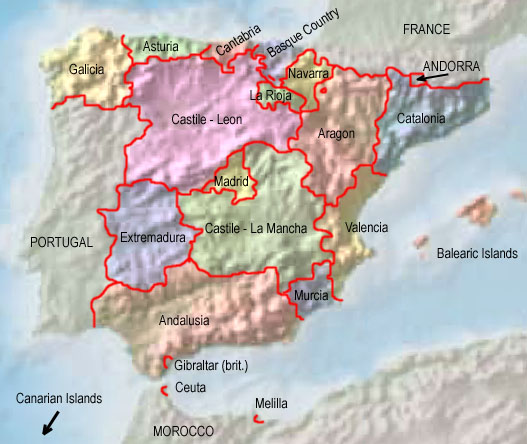
Quelle/Source: Freeware, University of Texas Libraries, modyfied by: Volker Preuß

Karte der historischen Königreiche auf der Iberischen Halbinsel (ca. 1220):
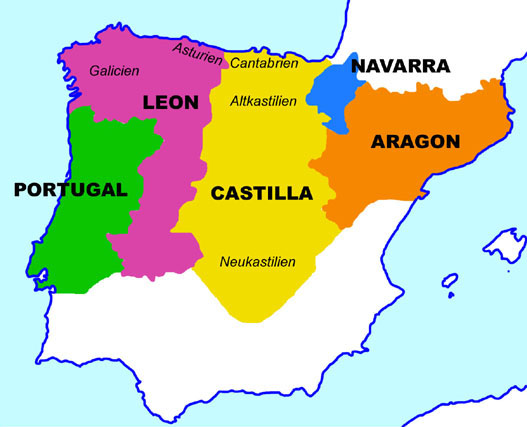
Landkarte/Map: Volker Preuß

Fläche: 10.385 km²
Einwohner: 664.117 (2022), davon 80% Navarrische Kastilier, 15% Basken
Bevölkerungsdichte: 64 Ew./km²
Hauptstadt: Pamplona (Iruñea), 203.418 Ew. (2022)
Amtssprachen: Spanisch, Baskisch
Währung: spanische (Euro-)Währung
Zeitzone: MEZ
Quelle: Wikipedia (DE)

Antike · Besiedlung durch den iberischen Stamm der Basken (Vaskonen)
ca. 600 v.Chr. · Einwanderung von Kelten, die Vasconen werden durch Vermischung zu Keltiberern, den heutigen Basken
218–201 v.Chr. · Zweiter Punischer Krieg, das Römische Reich erwirbt die Besitzungen Karthagos in Iberien, Unterwerfung der ganzen Iberischen Halbinsel bis zum Jahre 19 v.Chr., römische Besiedlung, Romanisierung, das heutige Navarra kommt zur römischen Provinz Hispania Tarraconensis
ca. 400 n.Chr. · Völkerwanderung, Durchzug von Alanen, germanischen Sweben und Westgoten
714 · von Nordafrika kommende Araber erobern Navarra
778 · das Frankenreich unter Karl dem Großen erobert Navarra, Errichtung der Spanischen Mark im Pyrenäenvorland, jedoch Niederlage gegen die Basken im Tal von Ronceval
795–812 · Wiedererrichtung der Spanischen Mark durch Karl den Großen und Ludwig den Frommen, dem Sohn von Karl dem Großen
812 · Befreiung der Stadt Pamplona von den Arabern durch die Basken, Errichtung des Königreichs Pamplona
816–851 · Herrschaft von Iñigo Arista über Pamplona
827 · erfolgloser Aufstand der Basken gegen das expandierende Frankenreich, Pamplona wird als Grafschaft Teil der Spanischen Mark
905 · der zum Grafen von Navarra (Grafschaft Pamplona) gewählte Sancho Garcia ernennt sich zum König von Navarra und macht sich vom Fränkischen Reich unabhängig
905–925 · König Sancho von Navarra befreit die Gebiete nördlich des Flusses Ebro, Teile des heutigen Aragonien und Teile Kastiliens von den Arabern
925 · Tod von König Sancho
1001–1035 · Regierungszeit von Sancho III. (der Ältere), nach seinem Tod wird das Königreich unter seine vier Söhne aufgeteilt: Garcia erhält Alt-Navarra und Biscaya, Ferdinand erhält Teile Kastiliens, Ramiro erhält Aragonien, Gonzales erhält Tudela
1076 · König Sancho Ramiro von Aragonien stürzt König Sancho IV. von Navarra und vereinigt beide Reiche
1134 · Tod von König Alfons I., Navarra wird wieder ein selbstständiges Königreich
1200 · Gebietsabtretungen an Kastilien
1234 · Tod von König Sancho VII. von Navarra, damit stibt die Dynastie Sancho in Navarra aus, das Erbe geht an Thibaut von Champagne
1285 · Johanna von Champagne, die letzte Erbin des Hauses, heiratet König Philipp IV. (den Schönen) von Frankreich aus dem Hause der Kapetinger
1328 · Tod von König Ludwig X., Aussterben der Hauptlinie der Kapetinger, Johanna II. die Tochter Ludwigs X. erbt Navarra, ihr Gemahl Philipp III. Graf von Evreux wird damit König von Navarra
1332 · Gebietsabtretungen an Kastilien
1375–1379 · Krieg Navarras (unter Karl II. [dem Bösen], Sohn von Philipp III.), Wales und Aragoniens gegen Frankreich und Kastilien, Navarra wird verwüstet
1379 · Gebietsabtretungen an Kastilien
1445 · Blanka, die Enkelin von Karl II., heiratet König Johann von Aragonien, beide Königreiche werden vereinigt
1479 · Tod von König Johann von Aragonien, das Erbe geht an seine Tochter Königin Eleonore, verheiratet mit Gaston Graf von Foix und Vicomte von Béarn (Aragonien ist mit Foix und Béarn verbunden)
1484 · Johann von Albret (Jean d'Albret) erwirbt durch Heirat das Königreich Navarra
1510 · Gebietsabtretungen an Frankreich
25.07.1512 · Königin Katharina, die Enkelin von Johann von Albret, verliert im Krieg Obernavarra (das heutige spanische Navarra) an das Königreich Spanien, jedoch behält Obernavarra wichtige Privilegien als eigenes Königtum innerhalb Spaniens
1517 · Heinrich II., Sohn von König Johann von Aragonien, wird König von Navarra (Unternavarra das heutige französische Navarra)
1521 · Tod von König Ferdinand von Spanien (Gemahl von Isabella von Spanien), Heinrich II. versucht erfolglos Obernavarra zu erwerben
1527 · Heinrich II. heiratet Margarete von Valois, die Schwester von König Franz I. von Frankreich
1581 · Gebietsabtretungen an Frankreich
August 1589 · König Heinrich III. von Navarra, Enkel von Heinrich II., wird König von Frankreich, Navarra (Unternavarra) wird mit Frankreich verbunden
1789 · Französische Revolution, vorübergehende Abschaffung der Monarchie, faktisches Ende des eigenständigen Königtums von (Unter-)Navarra
1790 · Navarra und die Grafschaft Béarn werden zu einem Departement zusammengefasst (Basse-Pyrénées)
1808–1813 · Obernavarra ist durch französische Truppen besetzt
1814–1830 · Königreich Frankreich unter den Bourbonen, nominell: "Könige von Frankreich und Navarra"
1830 · die Könige von Frankreich legen den Titel "König von Navarra" ab
1839 · Tod des letzten Königs von (Ober-)Navarra
16.08.1841 · Obernavarra wird als Provinz Pamplona vollständig nach Spanien eingegliedert, jedoch behält es wichtige Privilegien
1874 · Abschaffung der letzten Privilegien von Obernavarra
1936–1939 · Spanischer Bürgerkrieg, Navarra kämpft mit seiner Miliztruppe "Requetés" an der Seite der Franco-Truppen gegen die sozialistische Zentralregierung
1982 · Navarra erhält das Autonomiestatut innerhalb Spaniens (ehemalige Provinz Pamplona), Gründung der "Autonomen Gemeinschaft Navarra" (Comunidad Foral de Navarra)
Quelle: Wikipedia (ES),
World Statesmen,
RetroBib Retrobibliothek,
Volker Preuß

Der Ursprung des Namens "Navarra" ist nicht geklärt, wahrscheinlich geht er auf ein baskisches Wort zurück, denn im Mittelalter wurde in Navarra ausschließlich Baskisch gesprochen.
Quelle: Wikipedia (ES)


![]()


























